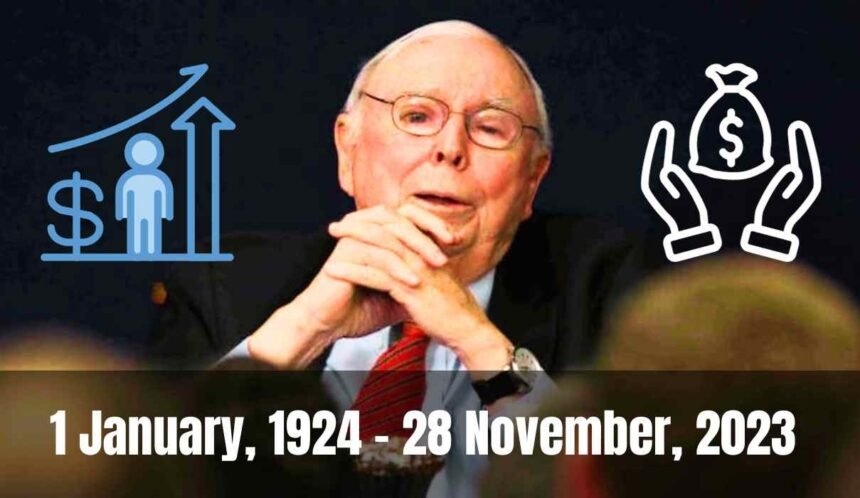With legendary investor Charlie Munger’s passing this yesterday at the age of 99, much attention turns to the vast fortune he accumulated over an unparalleled career spanning nearly 70 years in business and finance.
Estimated by Forbes to total $2.6 billion at the time of his death, Munger’s net worth crown him as both a financial wizard and one of recent history’s wealthiest capitalists. But those closest to Munger say material riches always took a backseat to intellectual pursuits and close connections cultivated over a lifetime.
Overseeing Berkshire Hathaway alongside Warren Buffett as vice chairman since 1978, Munger deserves credit as an architect of what is today a $700 billion empire spanning insurance, manufacturing, utilities, retail and services.
Through transformation deals and investments orchestrated alongside Buffett for over four decades, Munger proved instrumental in shepherding Berkshire from a struggling textile mill into the profitable powerhouse conglomerate it remains today.
Yet even with vast means later in life as one of America’s wealthiest money managers, Munger eschewed the trappings of fame and fortune that consumed many peers. He maintained grounded midwestern sensibilities and prioritized family, friends and community ties back home in Omaha over mingling with fellow billionaires or paying much mind to his ever-rising net worth.
Rooted in the Heartland
A 1924 New Year’s baby born and bred in Omaha just blocks from Warren Buffett’s own childhood home, Munger came of age during the Great Depression and had a front row seat to the deprivation that comes from financial instability.
Witnessing those struggles firsthand likely instilled the value of prudent financial management and desire for economic security that later catapulted a young Charlie Munger to became one of history’s most successful investors.
But while Munger clearly recognized the benefits self-made money can provide individuals and communities, personal enrichment was never the end goal behind his business endeavors. Far from a ruthless robber baron chasing pennies, Munger built abiding institutions squarely aligned with the interests of shareholders, clients and society.
“Charlie has done pretty well financially but he doesn’t think about money,” Munger’s friend Rick Guerin told Berkshire Hathaway expert and author Brent Schlender for the book “The Oracle Speaks: Warren Buffett in His Own Words”.
“But even if he had made nothing, his life would have been just as fulfilled,” Guerin continued. “He thinks about other things – philanthropy, friends, causes, ideas.”
Architect of Omaha
Rather than silo himself among fellow billionaires, Munger prioritized time among family, friends and Berkshire co-investors from all walks of life who viewed him as a mentor.
He empowered managers across Berkshire’s constellation of companies with autonomy to operate independently and direct capital to its best use rather than forcing investments to chase quarterly results.
Entrepreneur and author Shane Parrish collected years worth of Munger’s speeches and off-the-cuff wisdom into an anthology that reveals an individual far more interested in community than personal financial gain.
At his core, generosity and enriching the lives of others mattered much more to Charlie Munger than any specific number tied to his personal net worth. The multi-billion dollar fortune he leaves behind stands more as a byproduct of that mission rather than an end unto itself.
“Munger’s teachings have never been about getting rich,” Parrish notes. “They’re about living with understanding while avoiding problems and bad behavior.”
Even in his final years, eyewitnesses often spotted Munger driving himself around Omaha to run daily errands. Relying on the local bank branch for basic needs just like any elder statesmen, one of the world’s wealthiest investors consistently lived a grounded life out of the spotlight among family and childhood confidantes in middle America rather than decamping to some far flung billionaire’s enclave.
The Legend and Legacy
As Munger cultivated expertise across fields like real estate, architecture, psychology and investing, he relished opportunities to teach promising minds about rational thinking and wisdom through multidisciplinary mental models.
He often distilled epigrams about business and life spoke more to practical ethics for fulfillment versus simply getting rich.
“Acknowledging what you don’t know is the dawning of wisdom,” Munger oft said, urging investors young and old alike to carefully consider their “circle of competence” before allocating capital.
But even at the helm of one history’s greatest fortunes, simplicity and moderation ruled Munger’s lifestyle.
“I don’t believe in dynastic wealth,” Munger told Fortune Magazine in 2021 interview. “I try to live a normal life. I don’t want anyone to know where my house is.”
Rather than engineers a sprawling estate befitting his billionaire status, Munger’s cherished his self-designed California beach home integrating steel reinforced walkways built directly into the cliffside to withstand harsh coastal conditions.
And even with vast means, he made family and Omaha community pillars right up until the very end.
The Oracle in the Shadows
In amassing one the monumental investment fortunes of the modern era stemming from his Berkshire Hathaway partnership with Warren Buffett, Munger made a career of questioning conventional financial wisdom.
Rather than chase short-term performance like most money managers, Munger adopted an enduring entrepreneurial mindset better suited to overseeing conglomerates like Berkshire.
“Our favorite holding period is forever,” he often reminded critics focused on breaking up Berkshire’s holdings to chase more immediate payouts.
That outsider mindset questioning the status quo made Munger the perfect counterweight balancing Buffett’s skills as Berkshire grew.
“Of all the things I’ve learned from Charlie, maybe the most important thing was just to look at problems differently,” said money manager Mohnish Pabrai said in a 2022 interview. “Don’t just accept the orthodoxy.”
Great Partnership
In collectors one the immense fortunes ever derived from equity investing, Munger made a career of digging deeper into fields like psychology and economics to question assumptions and gain an enduring edge.
Yet even as he deeply examined human nature, those closest to Munger recall his childlike wonder towards life and generosity of spirit – both rare traits among billionaires obsessed with making money numbers grow ever higher.
The essential indifference Munger displayed towards accumulating wealth for its own sake made him a unique figure compared to other titans of finance fixated on dollars and cents.
Longtime associates say Munger always maintained an elemental indifference to wealth that directly contrasted contemporaries consumed by counting coins in their stockpiles.
“Charlie radiates well being, there isn’t the slightest tinge of resentment or envy or anything negative in him,” Guerin told author Brent Schlender. “He makes Scrooge look like a whiner.”
The richness of Munger’s lifelong partnerships stand as indelible portraits of meaning made rather than simply wealth created. In even the worst of tribulations, accounts depict Munger maintaining an optimistic spirit and determination to overcome.
While Munger certainly appreciated benefits prudent money management confers, his teachings and legacy point to deeper definitions of prosperity beyond balance sheets.
“Charlie wants to be rich, not for the money but so he can give it all away,” Guerin remarked of the Berkshire sage.
As strange as it seems given the gigantic financial fortune Munger became synonymous with, perhaps the biggest takeaway from examining his nearly century-spanning life comes back to those simple Midwestern roots.
“Just learn, learn, learn all the time,” Munger often said. “That’s the secret.”





